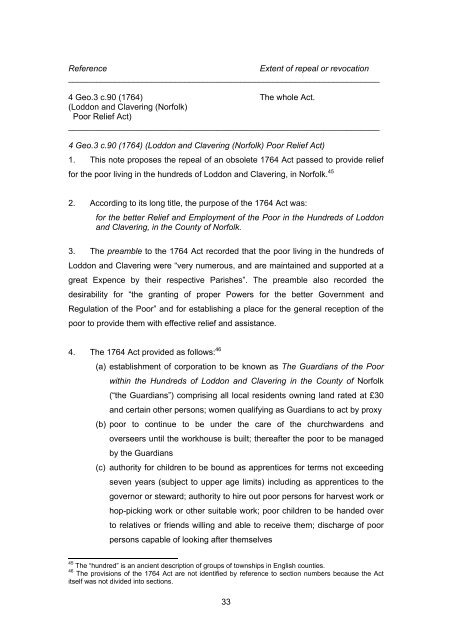Poor Relief - Law Commission
Poor Relief - Law Commission
Poor Relief - Law Commission
You also want an ePaper? Increase the reach of your titles
YUMPU automatically turns print PDFs into web optimized ePapers that Google loves.
Reference Extent of repeal or revocation<br />
___________________________________________________________________<br />
4 Geo.3 c.90 (1764) The whole Act.<br />
(Loddon and Clavering (Norfolk)<br />
<strong>Poor</strong> <strong>Relief</strong> Act)<br />
___________________________________________________________________<br />
4 Geo.3 c.90 (1764) (Loddon and Clavering (Norfolk) <strong>Poor</strong> <strong>Relief</strong> Act)<br />
1. This note proposes the repeal of an obsolete 1764 Act passed to provide relief<br />
for the poor living in the hundreds of Loddon and Clavering, in Norfolk. 45<br />
2. According to its long title, the purpose of the 1764 Act was:<br />
for the better <strong>Relief</strong> and Employment of the <strong>Poor</strong> in the Hundreds of Loddon<br />
and Clavering, in the County of Norfolk.<br />
3. The preamble to the 1764 Act recorded that the poor living in the hundreds of<br />
Loddon and Clavering were “very numerous, and are maintained and supported at a<br />
great Expence by their respective Parishes”. The preamble also recorded the<br />
desirability for “the granting of proper Powers for the better Government and<br />
Regulation of the <strong>Poor</strong>” and for establishing a place for the general reception of the<br />
poor to provide them with effective relief and assistance.<br />
4. The 1764 Act provided as follows: 46<br />
(a) establishment of corporation to be known as The Guardians of the <strong>Poor</strong><br />
within the Hundreds of Loddon and Clavering in the County of Norfolk<br />
(“the Guardians”) comprising all local residents owning land rated at £30<br />
and certain other persons; women qualifying as Guardians to act by proxy<br />
(b) poor to continue to be under the care of the churchwardens and<br />
overseers until the workhouse is built; thereafter the poor to be managed<br />
by the Guardians<br />
(c) authority for children to be bound as apprentices for terms not exceeding<br />
seven years (subject to upper age limits) including as apprentices to the<br />
governor or steward; authority to hire out poor persons for harvest work or<br />
hop-picking work or other suitable work; poor children to be handed over<br />
to relatives or friends willing and able to receive them; discharge of poor<br />
persons capable of looking after themselves<br />
45<br />
The “hundred” is an ancient description of groups of townships in English counties.<br />
46<br />
The provisions of the 1764 Act are not identified by reference to section numbers because the Act<br />
itself was not divided into sections.<br />
33
















